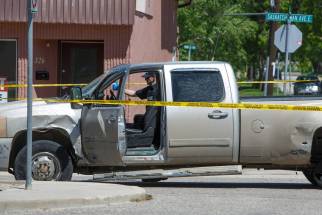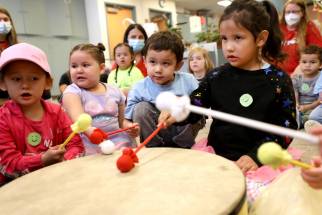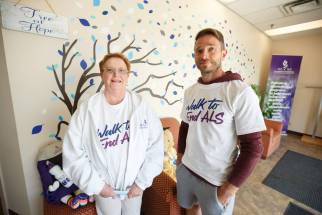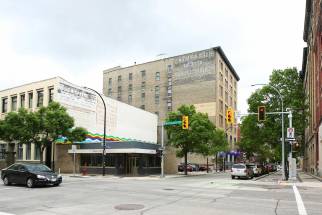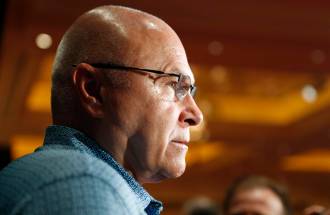‘Be grateful for what you have’ Once-active marathoner diagnosed with ALS shines light on devastating disease
Read this article for free:
or
Already have an account? Log in here »
To continue reading, please subscribe:
Monthly Digital Subscription
$0 for the first 4 weeks*
- Enjoy unlimited reading on winnipegfreepress.com
- Read the E-Edition, our digital replica newspaper
- Access News Break, our award-winning app
- Play interactive puzzles
*No charge for 4 weeks then price increases to the regular rate of $19.00 plus GST every four weeks. Offer available to new and qualified returning subscribers only. Cancel any time.
Monthly Digital Subscription
$4.75/week*
- Enjoy unlimited reading on winnipegfreepress.com
- Read the E-Edition, our digital replica newspaper
- Access News Break, our award-winning app
- Play interactive puzzles
*Billed as $19 plus GST every four weeks. Cancel any time.
To continue reading, please subscribe:
Add Free Press access to your Brandon Sun subscription for only an additional
$1 for the first 4 weeks*
*Your next subscription payment will increase by $1.00 and you will be charged $16.99 plus GST for four weeks. After four weeks, your payment will increase to $23.99 plus GST every four weeks.
Read unlimited articles for free today:
or
Already have an account? Log in here »
Hey there, time traveller!
This article was published 16/06/2022 (1271 days ago), so information in it may no longer be current.
Until six months ago, Kevin Rosen’s internet searches were fuelling his growing fear.
Unexplained changes to his physical abilities had been plaguing him. It started subtly: the soft-spoken 50-year-old Winnipegger began to have trouble getting words out. He was involuntarily slurring his speech. Even though he was in great shape, he felt weak. Then, his muscles started twitching. He wondered if he’d unknowingly had a stroke.
Rosen is an active dad and seven-time marathon runner, but online symptom checkers pointed to a progressive neuromuscular condition that could steal his ability to walk, speak, and breathe. They turned out to be correct: amyotrophic lateral sclerosis (ALS), also known as Lou Gehrig’s disease.
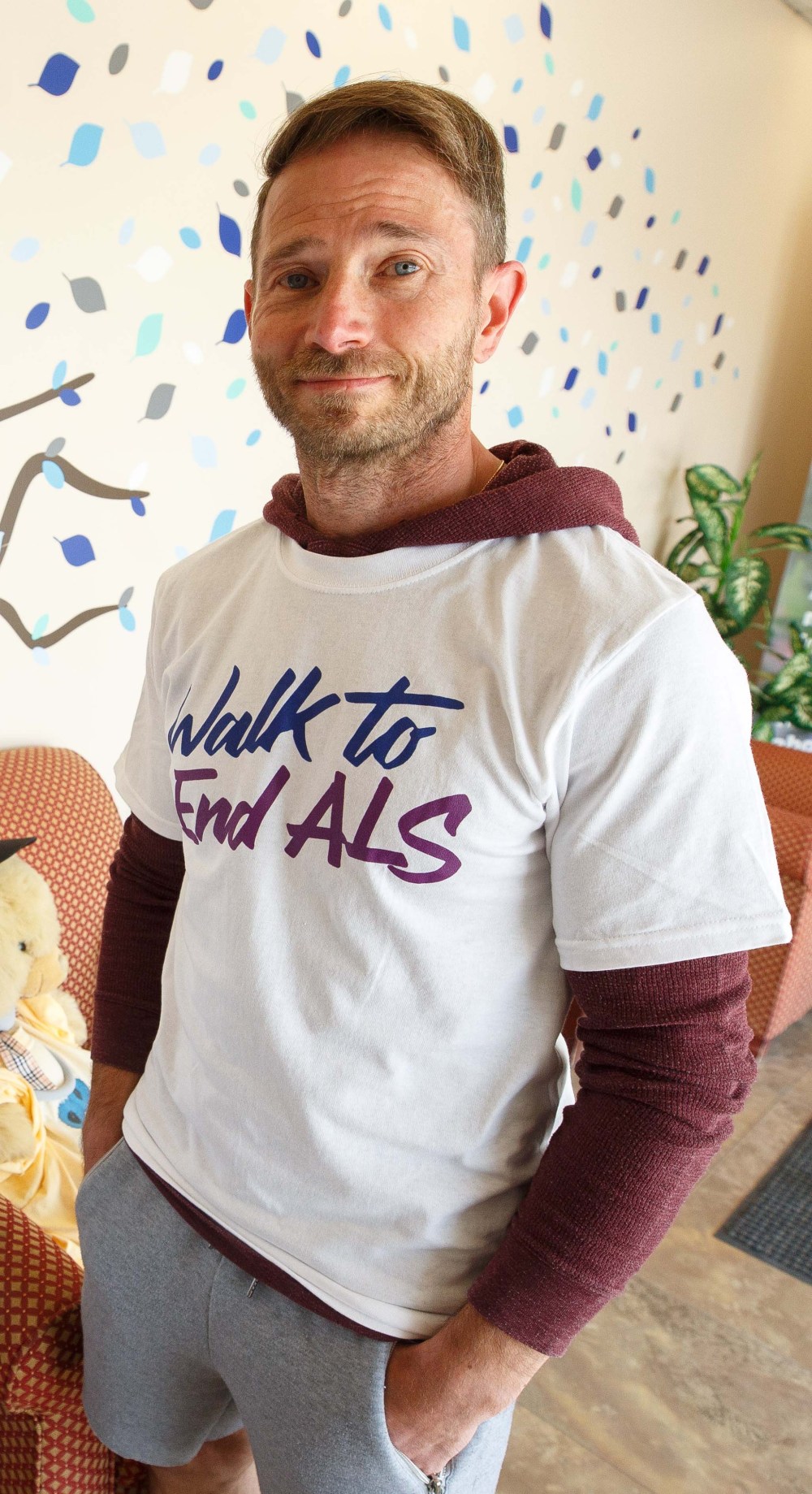
Now, having his fears confirmed via a medical ALS diagnosis was strangely freeing for Rosen, who is opening up about his experience in hopes of helping the more than 400 other Manitobans with ALS and related neuromotor conditions.
The paralysis-causing condition is fatal, and the majority of people with ALS die within two to five years of being diagnosed. There is no cure and current treatments don’t halt degeneration of parts of the brain and spinal cord.
His prognosis was a “gut punch” that took time to process but Rosen has been able to find glimmers of hope. His words are laboured now, but he’s finding his voice in a different way. As a self-described glass-half-full kind of guy, he wants to pass that cup around.
“What brings me some joy now is knowing that I have the chance to rebalance my life. I think, like many people, my life was out of balance before. And even though I have received a heartbreaking prognosis, I’m so grateful that I have some time to shift my priorities and really be present and focus on the things that matter,” he says in a recent interview.
One of the things that has mattered most is the outpouring of support Rosen received as soon as he started telling the people in his life what he was going through.
For more than two years, even as he endured a series of specialist visits and medical tests — that in January led to an ALS diagnosis via the process of elimination — Rosen kept quiet about his symptoms, confiding only in his wife Judi.
“I’ve always been a very private person,” he says. But as soon as he started opening up, support from family, friends, co-workers, and even distant acquaintances was “tremendous and touching.”
“It really helped soften the blow of the gut punch,” he says. “It helped me through a hard time, and even now, the love and support I receive, I’m so grateful for it, and it helps.”
Mission of hope
IMPROVING the daily lives of Manitobans with amyotrophic lateral sclerosis is just as important as supporting future research and a cure, says Diana Rasmussen, executive director of the ALS Society of Manitoba.
For 40 years, Rasmussen has been caring for people with ALS (also called Lou Gehrig’s disease). The non-profit organization relies on donations and annual fundraising events to keep providing costly medical devices, care, nutritional and support programs to its clients free of charge.
On Saturday, at 10 a.m., at Assiniboine Park, the 2022 Winnipeg Walk to End ALS begins after a two-year hiatus. Participants can register on the day of the event and donate money before or after the walk.
IMPROVING the daily lives of Manitobans with amyotrophic lateral sclerosis is just as important as supporting future research and a cure, says Diana Rasmussen, executive director of the ALS Society of Manitoba.
For 40 years, Rasmussen has been caring for people with ALS (also called Lou Gehrig’s disease). The non-profit organization relies on donations and annual fundraising events to keep providing costly medical devices, care, nutritional and support programs to its clients free of charge.
On Saturday, at 10 a.m., at Assiniboine Park, the 2022 Winnipeg Walk to End ALS begins after a two-year hiatus. Participants can register on the day of the event and donate money before or after the walk.
In a show of support, Kevin Rosen’s colleagues started a team in his name that has already raised more than $15,000. The overall goal is $155,000, Rasmussen said.
“With the (COVID-19) pandemic the last couple of years, we haven’t been able to raise as much money, so we really want to continue all of our programs and make sure that Manitobans who are affected by ALS and motor neuron diseases are well-supported in this province,” she said.
The organization supports ongoing research and clinical trials, but also supports ALS patients. Some don’t want to focus too much on a cure they may not be alive to see, she acknowledged.
“Our vision is improved quality of life for all people affected by ALS… and our mission is one of hope,” Rasmussen said.
It involves “Trying to get people to understand that today is today, tomorrow is tomorrow,” she explained. “Do as much that you can do, be safe in what you do, but enjoy your life and having a quality of life as well. This is not all doom and gloom. There is hope out there.”
More information is available on the ALS Society’s website.
June is ALS awareness month in Canada.
With certainty came some relief, Rosen says. When he didn’t know why he slurred or suddenly felt weak, he was self-conscious about it. No more.
“It feels more freeing to not have to work so hard to hide it,” he says. “It was a stressful couple years, and as strange as it sounds, when I got the diagnosis, part of me was relieved just to finally know what had been happening to me.”
That’s why speaking up now is important to him, Rosen explains. He has hope for research advancements, better treatment and a cure. Not just for himself but for other Manitobans coping with ALS.
Many of them will be taking part in a Walk to End ALS charity fundraiser at Assiniboine Park on Saturday morning, aiming to raise $155,000.

“I don’t know how much support each of them has, and I think the more attention we can raise for them, the better,” Rosen says.
In an interview, Rosen doesn’t gloss over the reality of his future but his optimism shines through.
Post-diagnosis, he stopped working after 25 years in marketing and communications. Like so much of his daily life, job tasks had been getting harder. He doesn’t need mobility equipment or medical devices yet, but he’ll turn to the ALS Society of Manitoba when he does.
“I know that it’s coming soon to a theatre near me,” he says lightly. “And when the time comes, I’m very grateful to know that there is an organization like that that’s equipped to help me and to help others in that situation.”
“It feels more freeing to not have to work so hard to hide it.” – Kevin Rosen
Now, his days consist of several hours of various speech, tongue and breathing exercises to try to maintain his level of muscle function. He goes for a run when he can, knowing he may not be able to for much longer, and tries to cut out all the noise and really enjoy time with family and friends.
There’s no time for aimless scrolling or responding immediately to every email, text and notification ding. Every day is different — a symptom that bothered him yesterday may be gone, only to reappear next month.
So Rosen takes it day by day and spends as much time as he can with the people he loves. “Be present” is his advice to his past self and to others — and not in a superficial way.
“Be grateful for what you have and appreciate the moment, because you never know how much time you’re really going to have left. I think people acknowledge that, but it’s almost a cliché,” Rosen says.
“Being able to actually experience that as I do now is what helps me be more positive and gives me hope.”
katie.may@freepress.mb.ca

Katie May is a general-assignment reporter for the Free Press.
Our newsroom depends on a growing audience of readers to power our journalism. If you are not a paid reader, please consider becoming a subscriber.
Our newsroom depends on its audience of readers to power our journalism. Thank you for your support.
History
Updated on Friday, June 17, 2022 11:21 AM CDT: Tweaks lede.


